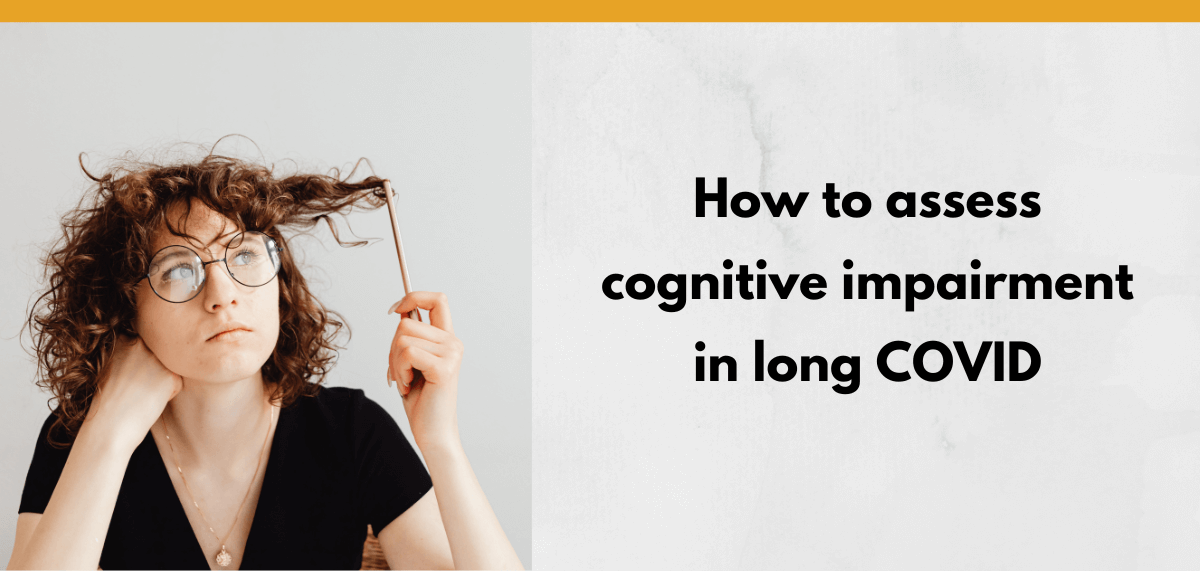Cognitive impairment is one of the most frequently reported symptoms of long COVID. Learn how to use evidence-based methods to assess cognitive impairment in patients who are living with long COVID.
Free DIRECT download: Assess cognition in long COVID (cheat sheet). (Email subscribers get free access to all the resources in the Free Subscription Library.)
Outline:
- What is long-COVID?
- Common symptoms of long COVID.
- What is brain fog?
- Is long COVID considered a disability under the Americans with Disabilities Act?
- Assess cognitive impairment in long-COVID.
- Learn more about cognitive impairment in long COVID.
- Related Eat, Speak, & Think posts.
- Selected References.
What is long-COVID?
Long COVID is one name for post-COVID conditions. Other names include long-haul COVID, post-acute COVID-19, chronic COVID, and post-acute sequelae of SARS CoV-2 infection (PASC).
The US Department of Health and Human Services (HHS) defines long COVID as “the signs, symptoms, and conditions that continue or develop after initial COVID-19 or SARS-CoV-2 infection.”
The current working definition starts this way:
The [symptoms] are present four weeks or more after the initial phase of infection; may be multisystemic; and may present with a relapsing-remitting pattern and progression or worsening over time, with the possibility of severe and life-threatening events even months or years after infection.”
US Department of Health and Human Services. (2023, March 12)
The HHS goes on to say that long COVID is not a solitary condition. “It represents many potentially overlapping entities, likely with different biological causes and different sets of risk factors and outcomes.”
Common symptoms of long COVID
The American Medical Association (AMA) reports the following common symptoms of long COVID:
- Fatigue
- Brain fog
- Insomnia
- Changes in smell and taste
- Shortness of breath
- Chest pain
- Palpitations
- Dizziness
- Depression
- Anxiety
In addition to general fatigue and brain fog, an article in The New England Journal of Medicine reports that some people who have been infected with COVID-19 have impairments in the following skill areas:
- Attention
- Executive function
- Language
- Processing speed
- Memory
What is brain fog?
Brain fog is a term for a cognitive-communication impairment that results in confusion, memory issues, or impaired concentration.
Brain fog may be due to one or more possible causes, such as:
- Stress.
- Impaired sleep.
- Side effect of medications.
- Hormonal changes.
- Diet lacking in Vitamin B12.
- Eating certain foods if one has food allergies or sensitivities.
- Chemotherapy.
- Depression.
- Medical conditions such as anemia, diabetes, migraine, and hypothyroidism.
- Autoimmune diseases such as arthritis, lupus, and multiple sclerosis.
- Viral infections such as COVID-19.
In her MedBridge course titled Management of Cognitive-Communication Disorders in Long COVID Patients, Rebecca Boersma, MA, CCC-SLP reports that brain fog can manifest as:
- Severe cognitive fatigue and crashes.
- Slowed processing.
- Impaired working memory.
- Making simple mistakes.
- Loss of creativity.
- Trouble focusing.
- Trouble making decisions.
- Lack of initiation of simple tasks.
- Frequent word-finding difficulty.
Is long COVID considered a disability under the Americans with Disabilities Act?
Long COVID can be a physical or mental disability under the Americans with Disabilities Act (ADA), if it substantially limits one or more major life activities.
Long COVID can be a disability even if the effects come or go, and is judged based on performance “without the benefit of any medication, treatment, or other measures used by the individual to lessen or compensate for symptoms.”
See the ADA website for more information about rights and resources for people with long COVID.
Assess cognitive impairment in long COVID
This information comes from a MedBridge course which I highly recommend: Management of Cognitive-Communication Disorders in Long COVID Patients*.
*This is an affiliate link. At no extra cost to you, you can help keep Eat, Speak, & Think sustainable if you subscribe through this link or use the code EatSpeakThink. Learn more about the discount.
In this course, Rebecca Boersma, MA, CCC-SLP provides an excellent overview of where the field stands in managing cognitive dysfunction in Long COVID. She shares many tips, insights, and resources which is beyond the scope of this article to cover.
Boersma points out that, unfortunately, we don’t yet have evidence-based interventions specifically tested for COVID-19. However, the cognitive effects of COVID-19 present like Traumatic Brain Injury (TBI), so the current guidance is to use TBI as a model.
The SLP’s role
When assessing and treating people with cognitive-communication impairments from long-COVID, we need to keep our role firmly in mind.
The goal for SLP engagement is to enable individuals to restore, to the fullest extent possible, their premorbid cognitive-communicative functioning in order to resume their participation in personal, professional, and community activities.
Boersma, slide 39
The evidence-based tools that we can use to assess cognitive-communication skills include motivational interviewing, collaborative goal setting, patient-reported outcome measures, and standardized assessment tools.
In her presentation, Boersma emphasizes motivational interviewing, collaborative goal setting, and patient-reported outcome measures over standardized assessment tools. She points out that it is a common myth that insurance companies require standardized assessment tools.
Boersma reports that she almost never uses standardized tests, for several reasons. The measures often aren’t sensitive enough to reflect the patient’s experience of impairment, and often fail to pick up on gains from therapy. Standardized assessment is often stressful for the patient, which can compromise rapport and fail to capture current abilities. And the cognitive effort required may trigger a cognitive crash, which could take the patient hours or days to recover from.
She stated that we’re required to establish medical necessity and the need for speech-pathology services, but this can be done with the information that we obtain from motivational interviewing and a patient-reported outcome measure.
Motivational Interviewing (MI)
Motivational interviewing (MI) is an evidence-based method for engaging patients in personalized therapy to promote meaningful change. You can learn more about Motivational Interviewing through courses, journal articles, and training. Honeycomb Speech Therapy has a great cheat sheet which can give you a good overview of the process.
The principles of MI suggest that we should:
- Express empathy through reflective, non-judgemental listening.
- Assist patients to see the discrepancy between their current abilities and their goals.
- Roll with resistance. Don’t try to reason with your patient.
- Support self-efficacy and resilience.
Collaborative goal setting
When we engage our patients in developing individualized goals that are personally meaningful and relevant, we are engaging in collaborative goal setting. Boersma provides examples in her presentation.
I’ve also written about collaborative goal-setting for cognitive impairments, where you can see some other examples.
Patient-reported outcome measures (PROMs)
Patient-reported outcome measures (PROMs) are powerful tools that allow patients to share their own experiences, strengths, and difficulties. PROMs are “critical in the development of patient-centered approaches to intervention” (Yorkston & Baylor, 2019, p. 8).
Ultimately, our patients must decide if treatment has been effective or not.
Yorkston & Baylor (2019)
We use PROMs at initial evaluation and at discharge to demonstrate the outcomes of therapy. You can learn more about PROMs in the tutorial by Yorkston & Baylor (2019).
Boersma reports that she uses the following PROMs:
- Neuro-QoL.
- PROMIS Cognitive Function.
- Modified Fatigue Impact Scale.
- Multifactorial Memory Questionnaire.
- Behavior Rating Inventory of Executive Function – Adult Version.
- Communicative Participation Item Bank.
- La Trobe Communication Questionnaire.
Standardized assessment tools
There are many standardized assessment tools that measure cognitive-communication skills. Boersma reports she sometimes uses the following:
- Repeatable Battery for the Assessment of Neuropsychological Status (RBANS)
- Functional Assessment of Verbal Reasoning and Executive Strategies (FAVRES)
- Cognitive Linguistic Quick Test (CLQT)
Learn more about cognitive impairment in long COVID
- Long COVID under the Americans with Disabilities Act.
- Healthline’s information about brain fog.
- Honeycomb Speech Therapy’s cheat sheet on motivational interviewing.
- Tutorial on patient-reported outcome measures.
- MedBridge’s course on managing cognitive disorders in long COVID*.
*This is an affiliate link. At no extra cost to you, you can help keep Eat, Speak, & Think sustainable if you subscribe through this link or use the code EatSpeakThink. Learn more about the discount.
Related Eat, Speak, & Think posts
- How to treat post-COVID cognitive dysfunction
- 18 free cognitive assessment tools. In the comments, you’ll find links to many more cognitive assessment tools.
- Collaborative goal-setting to identify meaningful cognitive goals.
- Goal Attainment Scaling tutorial. Use GAS instead of SMART goals to demonstrate personalized outcomes from skilled intervention.
Selected References
- Becker, J. H., Lin, J. J., Doernberg, M., Stone, K., Navis, A., Festa, J. R., & Wisnivesky, J. P. (2021). Assessment of Cognitive Function in Patients After COVID-19 Infection. JAMA Network Open, 4(10), e2130645–e2130645. https://doi.org/10.1001/jamanetworkopen.2021.30645
- Boersma, R. (2022). Management of Cognitive-Communication Disorders in Long COVID Patients (Recorded Webinar accessed (2023, March 6). MedBridge Education. https://www.medbridgeeducation.com/courses/details/management-of-cognitive-communication-disorders-in-long-covid-patients-recorded-webinar-rebecca-boersma
- Graham, E.L., Clark, J.R., Orban, Z.S., Lim, P.H., Szymanski, A.L., Taylor, C., DiBiase, R.M., Jia, D.T., Balabanov, R., Ho, S.U., Batra, A., Liotta, E.M. and Koralnik, I.J. (2021), Persistent neurologic symptoms and cognitive dysfunction in non-hospitalized Covid-19 “long haulers”. Ann Clin Transl Neurol, 8: 1073-1085. https://doi.org/10.1002/acn3.51350
- US Department of Health and Human Services. (2023, March 12). What is long COVID? https://www.covid.gov/longcovid/definitions
- Yorkston, K., & Baylor, C. (2019). Patient-Reported Outcomes Measures: An Introduction for Clinicians. Perspectives of the ASHA Special Interest Groups, 4(1), 8–15. https://doi.org/10.1044/2018_PERS-ST-2018-0001
Free DIRECT download: Assess cognition in long COVID (cheat sheet). (Email subscribers get free access to all the resources in the Free Subscription Library.)
Featured image by Karolina Grabowska from Pexels.
Lisa earned her M.A. in Speech-Language Pathology from the University of Maryland, College Park and her M.A. in Linguistics from the University of California, San Diego.
She participated in research studies with the National Institute on Deafness and other Communication Disorders (NIDCD) and the University of Maryland in the areas of aphasia, Parkinson’s Disease, epilepsy, and fluency disorders.
Lisa has been working as a medical speech-language pathologist since 2008. She has a strong passion for evidence-based assessment and therapy, having earned five ASHA Awards for Professional Participation in Continuing Education.
She launched EatSpeakThink.com in June 2018 to help other clinicians be more successful working in home health, as well as to provide strategies and resources to people living with problems eating, speaking, or thinking.



Be First to Comment